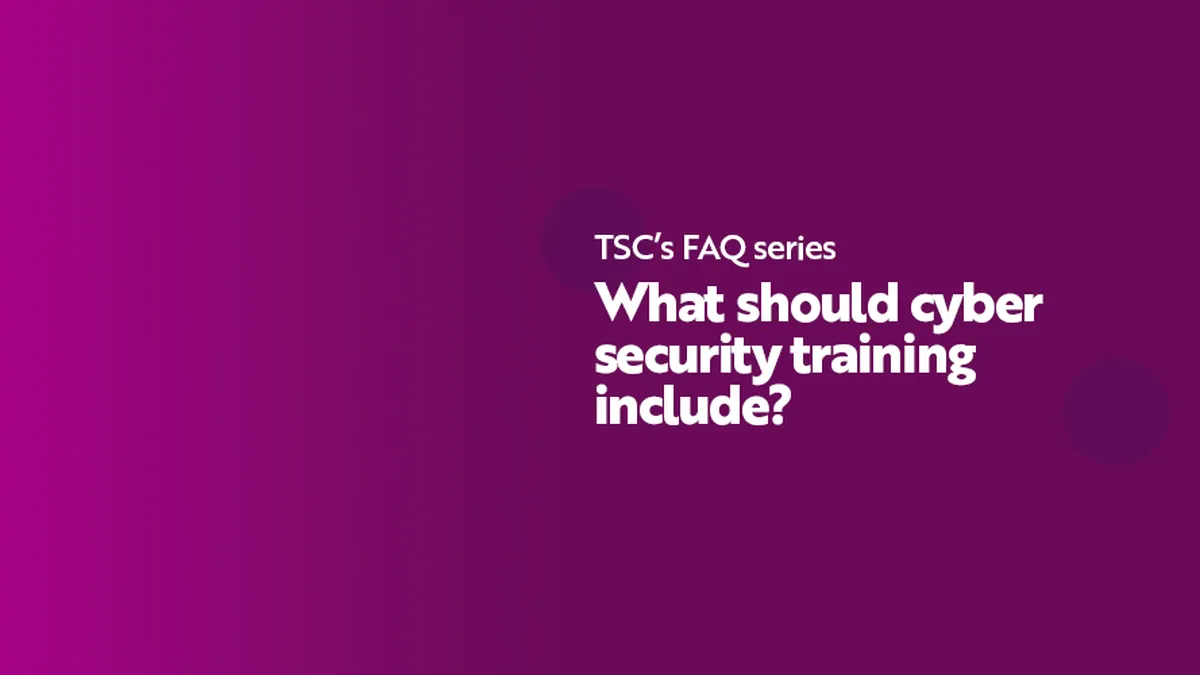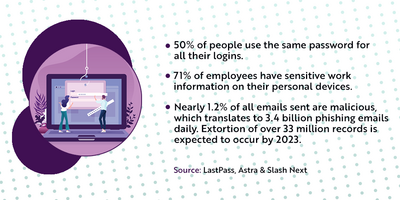
- Employee awareness
- 5 min read

Cyber threats continue to evolve, making robust cyber security training essential for organisations. Effective cyber security training programs provide employees with the knowledge and skills to protect sensitive information and mitigate risks and are often industry specific.
This article explores the key elements that should be included in comprehensive cyber security training. By addressing these critical areas, organisations can equip their workforce with the tools necessary to safeguard against cyber threats and promote a culture of security awareness.
However, please keep in mind that every organisation is unique and only a comprehensive analysis of your security culture and extensive behavioural analysis - using a tool like SABR - will truly reveal what your cyber security training should be focused on.

Here are 7 cyber threats and topics that are quintessential and ever-presents in successful cyber security training campaigns:
Cyber security training should begin with an overview of the threat landscape, including focus on common types of attacks such as phishing, malware, social engineering, and ransomware. Providing employees with insights into the tactics employed by cybercriminals increases their awareness and helps them identify potential threats. These common attacks need attention as your employees will encounter them on a weekly basis.
Employees must understand the importance of protecting sensitive data. Training should cover topics such as data classification, secure data handling and storage practices, and compliance with data protection regulations like GDPR or CCPA. Emphasising the significance of privacy and the potential consequences of data breaches helps foster a culture of responsibility and accountability. Use case studies and examples to explain the ramifications of a data breach to your employees.
Password security is a fundamental aspect of cyber security. Training programs should educate employees on creating strong, unique passwords, implementing multi-factor authentication, and avoiding password reuse. Employees should also be encouraged to report any suspicious activity related to their accounts to ensure a swift response to potential breaches.
Employees are often targeted through phishing emails and social engineering tactics. Training should include examples of phishing attempts, how to recognise them, and best practices for verifying the authenticity of emails or requests. By teaching employees to be cautious and sceptical, organisations can minimise the risk of falling victim to such attacks and having to pay out costly ransoms.
Employees need guidance on safe internet and browsing practices to mitigate risks. Training should cover topics such as avoiding unsafe websites, recognising malicious email attachments or links, and understanding the importance of secure file sharing and encryption. Educating employees about potential risks associated with public Wi-Fi networks and the use of virtual private networks (VPNs) also helps protect sensitive information.
With the rise of remote work and BYOD policies, training programs need to address the unique security challenges associated with BYOD and remote working. Employees need guidance on securing their home networks, using secure remote access tools, and understanding the organisation's policies regarding personal devices used for work purposes. Training should emphasise the importance of keeping devices and software up to date and following proper security protocols.
Employees should be aware of the organisation's incident reporting and response procedures. Training programs should provide clear guidelines on reporting security incidents, including who to contact and the necessary steps to take in the event of a breach. Conducting periodic drills and simulations helps employees practice incident response protocols and improves overall preparedness.
Comprehensive cyber security training is vital for organisations to enhance their overall security posture. By including essential elements such as understanding the threat landscape, data protection, password security, phishing awareness, safe internet practices, remote work security, and incident response, organisations can equip their employees with the knowledge and skills needed to protect against cyber threats.
TSC's comprehensive security induction eLearning and 5 Golden Rules can empower your employees to not only protect your business but also prevent potential data breaches.
By fostering a culture of security awareness through effective training programs, organisations can mitigate risks, safeguard sensitive information, and ensure the resilience of their digital infrastructure.
If you would like more information about how The Security Company can help you set up security induction training or how we deliver engaging and effective cyber security awareness materials for organisations of all sizes ... please contact our Head of Business Development and Sales, Jenny Mandley.
The Security Company's vast library of customised and non-customised products and services are tailored for small, medium and large organisations and are available in a variety of languages. We also offer bespoke solutions for organisations that desire training and awareness materials built from the ground up.



© The Security Company (International) Limited 2023
Office One, 1 Coldbath Square, London, EC1R 5HL, UK
Company registration No: 3703393
VAT No: 385 8337 51


